|

“If
I Had A Hammer, I’d Hammer in the Mornin’, I’d
Hammer in the Evenin, All Over This Land”
By
Joan Baum
And
he does. For close to 20 years now J. Mitchell Yates has been
smithing, a passion he’s pursued not as income-trade but as freelance
love. Though he makes his living as a carpenter, doing renovations,
restorations and fine woodworking, blacksmith work engages Yates
to the extent that he gives free public demonstrations and talks
about this little-known craft in a restored blacksmith shop in
Springs, East Hampton, NY. He also attends regional and national
blacksmith meetings, where the latest information is exchanged
and where an invited guest is likely to show off new techniques,
some designed to enhance ironwork as sculpture or historical restoration.
Yates himself is a member of the Northeast Blacksmiths Association
and of ABANA, Artist-Blacksmith’s Association of North America,
a non-profit organization that started with 20 members 25 years
ago and now boasts over 4,500.
Not surprisingly, considering the growing interest in the field,
information about the lost art of hand-forged metalwork can now
be found on the Net, and many colleges and universities regularly
include smithing in their fine arts programs. The ABANA website
provides a link to “educational programs”, and its newly formed
Education Committee is fast becoming a major resource for both
written and audio/visual materials about working with iron and
steel. Significantly, the site shows a woman hammering away. Yes
indeed, says Yates, there are women blacksmiths. And opportunities
for youngsters as well, such as the Ashoken Field Camp, connected
to SUNY New Paltz, which is an outdoor awareness program offering
classes in black and tin-smithing, broom-making, and other early
crafts.
Though the affable 34-year-old Yates left high-school at 17, it
is clear, thorough professional that he is, that he might have
chosen blacksmithing as a career, had the opportunity been presented
to him. He fell in love with historical metal work when he was
still in school and obviously liked the wider associations as
well– “buckskinning,” which refers to camping out in a manner
as close to the pre-Civil War period as possible, and “muzzle-loading
rifle,” both of which reached their apex in this country around
1845. These days blacksmithing attracts history buffs as well
as those with mechanical dexterity.” There will always be a demand
for ornamental, historically accurate iron work,” Yates says and
it would seem a growing interest in crafts in general for people
of all ages. A long-standing dream of his has been to offer smithing
instruction at senior centers, particularly in areas where a blacksmithing
presence has already been established.
Dispelling myths, Yates notes that blacksmiths can make a decent
living, and then some, depending on where they set up shop and
how creative they are, both as artisans and businesspeople. In
the Hamptons, for example, premier horse country, a smith could
build up a wealthy clientele and make a good income. (Mules and
oxen, incidentally, also wear shoes.) In horse country, it is
imperative that racehorses are properly shod (they wear different
shoes, depending on surface and activity), and top-of-the-line
blacksmiths could also open specialty stores, catering to patrons
who not only own horses but can afford unusual jewelry, an increasing
interest of women blacksmiths, who are a growing presence at nation-wide
“hammer ins.”
Those interested in blacksmithing will no doubt note the alternative
term, “ferrier,” dating back to usage in the Middle Ages.
And what of the dangers in pursuing blacksmithing as a career?
Yates smiles. His only problems are carpal tunnel (which he’s
already had) and tennis elbow, the typical hazards of the trade.
As for those blasting furnaces and odd-shaped anvils that absorb
precision hammering — no worry. Blacksmiths are incredibly safety
conscious, Yates says, an appreciation carefully cultivated in
courses and apprenticeship programs where appropriate gear (eye
and ear protection) and proper procedures dominate instruction.
Clearly, blacksmithing today would – and should – appeal to young
people who are good with their hands, as the old saying goes,
but who also appreciate the need for good business sense. An educational
blacksmithing program that includes marketing, American history,
and good communication skills could ensure that a tradition-bound
trade might well become a successful profession.

Education Update, Inc., P.O. Box 20005, New York, NY 10001. Tel:
(212) 481-5519. Fax: (212) 481-3919. Email: ednews1@aol.com.
All material is copyrighted and may not be printed without express consent of
the publisher. © 2001.
|

